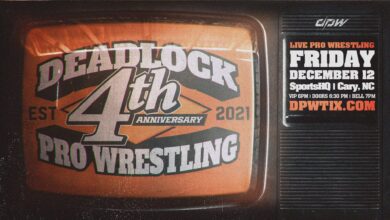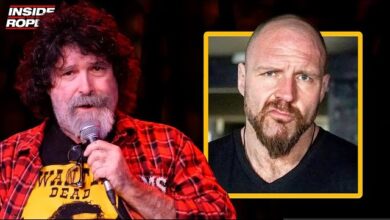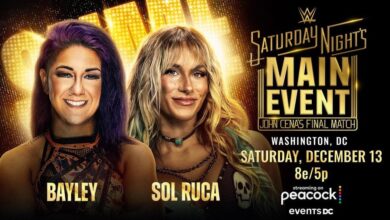A Tale Of Good vs. Evil – The Story Of Jushin Liger And Minoru Suzuki
Jushin “Thunder” Liger is a superhero. Like, for real, he was based on an anime superhero. Vince McMahon may have wanted Neville to be Mighty Mouse, he may call Ricochet a “real-life superhero” and he’ll watch Avengers: Endgame in ten years and put all the top faces into one group. But nothing Vince ever tries to do will top NJPW creating Jushin Liger based on the anime series.
Superheroes are meant to inspire and overcome. There’s a reason why Avengers: Endgame is the highest grossing film of all-time. The film is packed with roughly 2875 superheroes all working together to stop one man. It’s a film based on bullying, if you think about it, but we dismiss that because Vin Diesel only says one word. Everyone wants to be a superhero when they grow up. The magical powers are cool and all, but Batman doesn’t have any tremendous mythical powers, and he’s still popular. Why? Because Batman overcomes and goes back to his life of luxury. Superman, Captain America, Spider-Man, Black Panther, Wonder Woman; they all overcome the challenge in front of them.
Jushin “Thunder” Liger did not overcome at NJPW King of Pro Wrestling.
The rivalry between Liger and Minoru Suzuki was perfect. A superhero against the vilest man in New Japan. Liger makes sure to greet every fan, kiss some babies, and is a beacon of light in a dark world. Suzuki wants to eat faces and never leaves dark mode.
From April to June, Liger and Suzuki battled in the ultimate good vs. evil war. But nothing was settled. Neither man was giving an inch in this war. The two men hibernated from June until September. Maybe Liger thought the war was over. But Suzuki, being an evil genius, was coming up with a new plan of attack. And he had it figured out. The best way to take down a superhero is to force them to compromise their morals.
Suzuki beheaded Liger at Destruction in Kagoshima, screaming that he wanted the man behind the mask. The disrespect led to the return of Kishin Liger, the rarely used Liger alter-ego that only comes out when he runs into an evil force that cannot be overcome with simple good.
Suzuki laughed. His mission had been accomplished. He needed Liger to expose himself. The moral compromise scarred Liger. Though Liger had gotten the better of Suzuki visually, the reaction proved that Suzuki had won the battle.
At King of Pro Wrestling, Liger admitted Kishin was a mental misfire by not bringing him into the final showdown with Suzuki. Instead, he transformed into Battle Liger, a more level-headed alter-ego, determined to win the war.
In movies, the hero is unafraid to battle the villain on his terms. The Joker doesn’t come to the Batcave or Wayne Manor to fight Batman. The villain always has the upper hand in the final showdown because he/she forces the hero into battle on their terms. Despite the disadvantage, the hero always finds a way to overcome.
Liger battled Suzuki on his terms at King of Pro Wrestling. Instead of losing his cool and wildly attacking Suzuki, Liger took a more calculated approach. He wanted something other than revenge. The chair attacks, the beheading, and the ominous laugh feuled Liger. But seemingly not as much as a 2002 submission loss to Suzuki in Pancrase.
Suzuki is able to get away with his actions in the world of pro wrestling because of the fear he puts into everyone around him. Pro wrestlers are inherently tough and rarely backdown from a fight. But Suzuki, coming from a MMA background and billed as a “shooter,” is a different breed. You don’t mess with 99% of people in wrestling. You don’t fuck with Minoru Suzuki.
In an effort to throw Suzuki off his game, Liger was ready to fuck with Minoru Suzuki.
The approach was admirable. Suzuki expected ultimate good guy, ready to wrestle Jushin Liger or the darker, ready to fight Kishin Liger. He got a man ready to grapple, a man out to avenge, not for revenge.
It didn’t work.
Liger played Suzuki’s game and failed, succumbing to the Gotch Pildedriver. The moment the referee’s hand hit the mat for three, the crowd was deflated. Even if the final showdown wasn’t your typical Michael Bay-filled explosive action scene, the battle of wits and maneuvering still had fans on the edge of their seats. And they expected the hero to ultimately conquer the villain. Good always prevails over evil. That’s what the movies have taught us.
This was no movie. In what could be his final epic, Liger had lost the match.
But perhaps not the war?
Suzuki won. That’s what the record book will say. But his heart grew larger, at least for that day.
Instead of putting another nail in the coffin, Suzuki bowed to Liger following the bout. For the better part of his final year in wrestling, Liger was willing to engage with Suzuki. Liger could have done anything in his final year and no one would have second-guessed him. Instead of a big retirement tour with dream matches against some of the top juniors in the world, Liger willingly battled Suzuki. He brought out Kishin Liger at Suzuki’s request. He went into the final battle as Battle Liger. And he wanted to prove to Suzuki that he could beat him at his own game.
Suzuki, cold as he may be, respected that.
A man or woman doesn’t have to overcome by saving the world or killing the villain to be considered a hero. A hero can be someone who changes the way you view the world, changes how someone else may think or simply puts a smile on your face.
And while not all heroes wear capes. Jushin “Thunder” Liger does.




